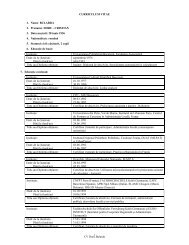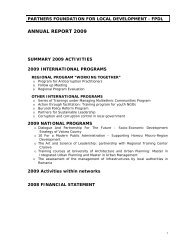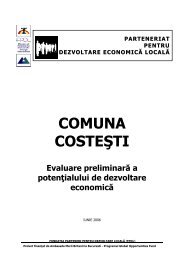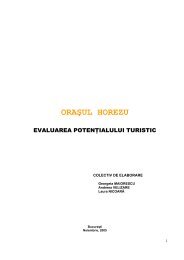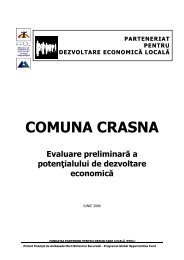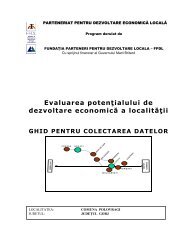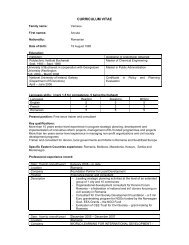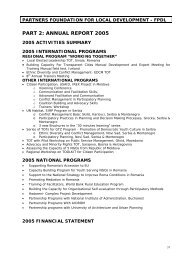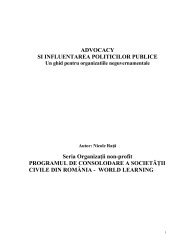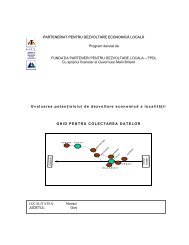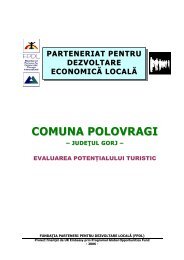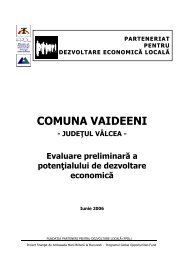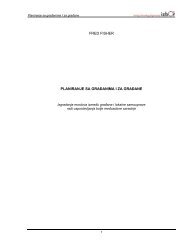Organizational Development: A Manual for Managers and ... - FPDL
Organizational Development: A Manual for Managers and ... - FPDL
Organizational Development: A Manual for Managers and ... - FPDL
Create successful ePaper yourself
Turn your PDF publications into a flip-book with our unique Google optimized e-Paper software.
are divided by our ignorance <strong>and</strong> misunderst<strong>and</strong>ings. Thus common knowledge may be seen as a<br />
key factor <strong>for</strong> synergy.<br />
When members of an organization share their knowledge by explaining to others what they<br />
underst<strong>and</strong>, <strong>and</strong> find agreement in their reaction (because experiences coincide) – then everyone<br />
multiples their own knowledge, <strong>and</strong> the collective knowledge base exp<strong>and</strong>s. When members of an<br />
organization share their mistakes, <strong>and</strong> deal with gaps in underst<strong>and</strong>ing (because experiences or<br />
misinterpretations of experiences rarely coincide) – then they are able to identify <strong>and</strong> fix them. This<br />
way the total number of errors <strong>and</strong> the probability of related misunderst<strong>and</strong>ings diminish. The<br />
integration of mental maps <strong>and</strong> their mutual correction in this process is always useful <strong>for</strong> each<br />
individual <strong>and</strong> <strong>for</strong> the organization as a whole; it produces a strong synergy effect.<br />
Relations between members of an organization may prevent them from joining their separate<br />
mental maps in a common field of organizational knowledge. When the structure <strong>and</strong> culture of an<br />
organization is such that everyone has a desire <strong>and</strong> possibility to share with others his<br />
underst<strong>and</strong>ing of the world (not defending his ‘point of view’ at any price, but making it more<br />
accurate through feedback from others), when individuals free themselves from the niche of<br />
individual delusion, <strong>and</strong> enter the wider field of common perception <strong>and</strong> underst<strong>and</strong>ing of reality –<br />
the speed of learning in an organization increases many times over – thus improving the chances<br />
<strong>for</strong> success. In this way a learning organization emerges.<br />
The term ‘learning organization’ was defined in 1990 by one of the best-known authors on the<br />
subject Peter Senge. It is an organization where “people continually exp<strong>and</strong> their capacity to<br />
create the results they truly desire, where new <strong>and</strong> extensive patterns of thinking are nurtured,<br />
where collective aspiration is set free, <strong>and</strong> where people are continually learning how to learn<br />
together.” According to Senge, “the core of work <strong>for</strong> a learning organization is based upon five<br />
‘learning disciplines’ - lifelong programs of study <strong>and</strong> practice:<br />
• Personal Mastery – learning to exp<strong>and</strong> our personal capacity to create the results we most<br />
desire, <strong>and</strong> creating an organizational environment, which encourages all its members to<br />
develop themselves toward the goals <strong>and</strong> purposes, they choose.<br />
• Mental Models – reflecting upon, continually clarifying, <strong>and</strong> improving our internal pictures<br />
of the world, <strong>and</strong> seeing how they shape our actions <strong>and</strong> decisions.<br />
• Shared Vision – building a sense of commitment in a group, by developing shared images<br />
of the future we seek to create, <strong>and</strong> the principles <strong>and</strong> guiding practices by which we hope<br />
to get there.<br />
• Team Learning – trans<strong>for</strong>ming conversational <strong>and</strong> collective thinking skills, so that groups<br />
of people can reliably develop intelligence <strong>and</strong> ability greater than the sum of individual<br />
members’ talents.<br />
130



